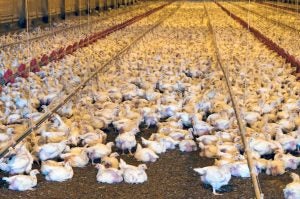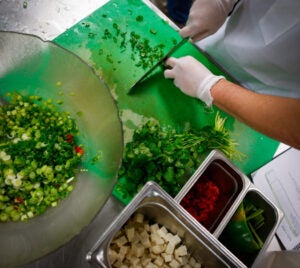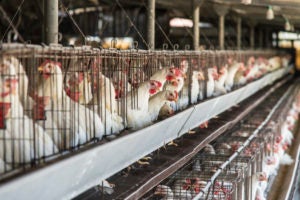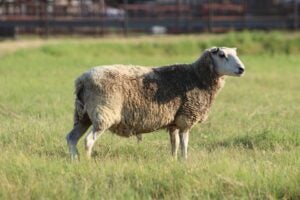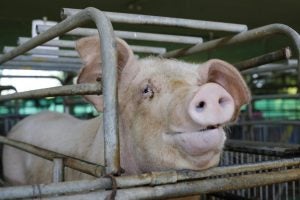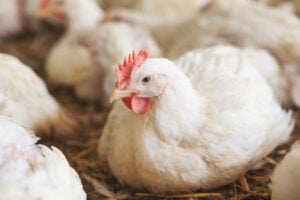
SÃO PAULO—Italian food group Barilla, the world’s largest pasta manufacturer, is the recipient of the Henry Spira Humane Corporate Progress Award, recognition given to companies that adopt policies that have a significant positive impact on the farm animals in their supply chains. Humane Society International, one of the largest animal protection organizations in the world, had nominated Barilla for the award, which is given by the Humane Society of the United States, HSI’s sister organization. With the award, both organizations recognize and celebrate Barilla’s transition to responsible sourcing of cage-free eggs in its global supply chain. Barilla is one of only a handful of companies in the world to achieve a 100% cage-free egg supply chain ahead of schedule.
HSI’s first contact with Barilla was in late 2016, and in just a matter of months the Italian company committed to exclusively sourcing eggs from cage-free hens and achieved full implementation of that commitment in 2019, one year before its publicly announced 2020 deadline. Exemplifying leadership in transparency, Barilla provided yearly progress updates on its egg sourcing statistics in its annual sustainability report. Barilla’s global policy applies to each of the countries in which they operate.
In Brazil, Barilla has played an especially important role as an example for other food companies, which it has publicly encouraged to create and implement cage-free egg policies. “Barilla’s leadership has inspired other companies in Brazil to embrace animal welfare and cage-free egg supply as a core element of responsible sourcing. Now we have over 100 companies committed to sourcing exclusively cage-free eggs in the country, and the number keeps growing. We hope that with Barilla’s great example, other companies will be inspired to follow suit. We have no doubt that the future is cage-free in Brazil,” noted Maria Fernanda Martin, HSI’s corporate policy and program manager for farm animals in Brazil.
At every stage, Barilla demonstrated a clear mission and vision, embraced at every level of the company and backed by its leadership through active and ongoing engagement with producers and consumers. HSI strongly supported Barilla’s transition to cage-free, facilitating farm tours, technical workshops, and peer-to-peer learning.
Animal welfare initiatives are part of Barilla’s global goals. According to Fabiana Araújo, marketing manager for Barilla in Brazil: “Receiving the Spira Award validates the brand’s efforts to have a sustainable production system. Commitment to innovation has led Barilla to be one of the few companies in the world to reach a production chain with 100% cage-free eggs, and the first company in the industrialized pasta segment in Brazil to adopt a cage-free egg policy.” “We seek to do the right thing in our business model, and that’s what we’ve done here. We benefited from the steady and constructive support of Humane Society International, and our partnership was crucial to Barilla’s early completion of our stated goal. Particularly in Brazil, where we have been present for only a few years, the support of HSI has been critical for success,” said Eldren Paixão, procurement manager for Barilla in Brazil.
Cage-free production systems typically offer hens higher levels of welfare, allowing the birds to express more of their natural behaviors, including moving around, laying eggs in nests, perching, and fully spreading their wings.
In celebration of Barilla’s journey and collaboration with HSI, the organization will host the 4th meeting of the South American Animal Welfare Movement, an online seminar on October 5 -9 for companies, producers, and investors. The seminar will feature practical insights on the benefits of adopting higher animal welfare practices and provide stakeholders with meaningful and applicable guidance on transitioning to cage free egg and crate free pork supplies. For more information and registration, please email mfmartin@hsi.org.
The Henry Spira Awards recognize significant corporate animal welfare commitments in the memory of Henry Spira (1927-1998), a legendary Belgian-American humane advocate who specialized in constructive engagement with corporations committed to an animal welfare mandate as part of their corporate social responsibility missions. He is considered one of the most effective animal advocates of the 20th century.
ENDS
Media contact for HSI in Brazil:
Maria Fernanda Martin, mfmartin@hsi.org, +55 (11) 9 5770 9922
Media contact for Barilla in Brazil:
4INFLUENCE, Alexandre Spínola | (11) 9.8346-5918, Marília Feliciano ||(11) 9.7637-2500, Amanda Amorim | (11) 9.8146-5850, barilla@4influence.com.br


